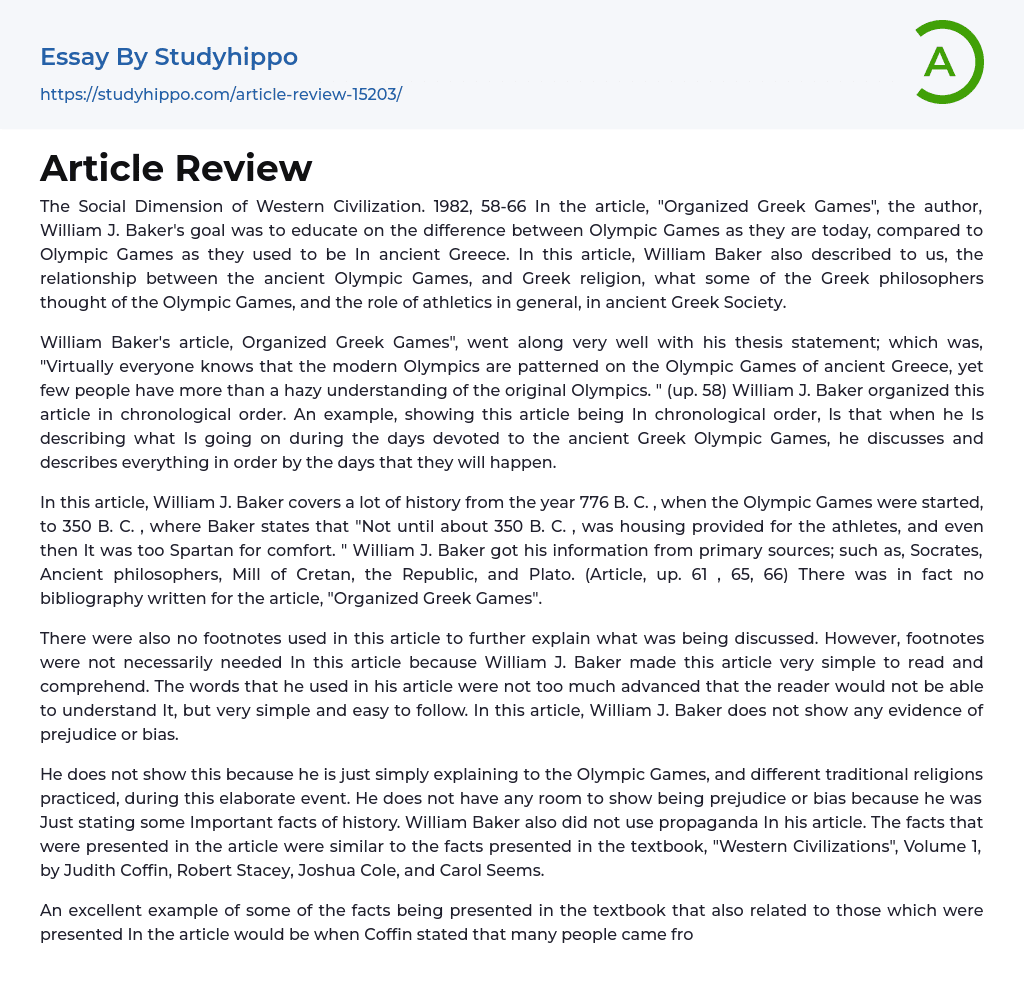The article "Organized Greek Games" by William J. Baker aims to educate readers about the contrast between modern Olympic Games and ancient Olympic Games in Greece. In addition, Baker explores the connection between the ancient Olympic Games and Greek religion, the perceptions of Greek philosophers regarding the Games, and the overall significance of athletics in ancient Greek society.
William Baker's article, "Organized Greek Games", aligns perfectly with his thesis statement, "Virtually everyone knows that the modern Olympics are patterned on the Olympic Games of ancient Greece, yet few people have more than a hazy understanding of the original Olympics." (up. 58) Baker structured his article in chronological order. For instance, he discusses and describes the events of the ancient Greek Olympic Games in the order they occur, adhering to a chronologica
...l framework.
In this article, William J. Baker discusses the history of the Olympic Games, which began in 776 B.C., and continues until 350 B.C. During this timeframe, Baker observes that housing for athletes was not provided until about 350 B.C., and even then it was not comfortable. Baker's information is sourced from primary sources such as Socrates, Ancient philosophers, Mill of Cretan, the Republic, and Plato (Article, up. 61, 65, 66). It is worth noting that no bibliography was included for Baker's article, "Organized Greek Games".
In this article, footnotes were not used to explain the content further. However, this was not necessary as William J. Baker made it simple to read and understand. The language used in the article was not too advanced, making it easy for the reader to comprehend. William J. Baker did not display any prejudice or bias in
this article.
The author does not display any prejudice or bias in explaining the Olympic Games and various traditional religions practiced during this detailed event. The purpose of the article is simply to present important historical facts, leaving no room for personal opinions. William Baker also refrains from using propaganda in this article. The facts presented align closely with those found in "Western Civilizations", Volume 1, by Judith Coffin, Robert Stacey, Joshua Cole, and Carol Seems.
The textbook and the article both discuss the participation and viewership of the Olympic Games. Coffin mentioned that many people from different parts of Greece and even beyond came to participate in or watch the Games. Meanwhile, Baker mentioned that spectators arrived from various directions and that official delegations from Greek city-states brought gifts for Zeus, the King of Gods, at the temple in Olympia.
An article that discusses the Ancient Greek Contribution in a similar manner.
Both sources indicate that Zeus was highly honored and revered as "the King of Gods" during the Olympic Games. This demonstrates that the textbook and the article agree and provide reliable information (Textbook, p. 80) (Article, p. 61). William J. Baker successfully achieved his goal stated at the beginning of the article, which was to educate people about the original Olympics (Article, p. 58). His thesis statement focused on comparing the ancient Greek Olympic Games to the modern Olympics we have today. This article is relevant to our western civilization history course as it discusses the roles of women in history. Baker enlightens us about the ancient Greek Olympic Games and the exclusion of women from participating in any of the events.
This reinforces the fact that women had limited rights throughout history, often being excluded from various activities.
Baker's article aims to clear up misconceptions and misunderstandings surrounding the Olympic Games, including their origin. It is crucial to understand that the ancient Olympics differed from the modern ones we know today. Surprisingly, swimming, kayaking, and archery were not part of the ancient Greek Olympics despite popular belief.
Written by Professor William J. Baker, this article is notable for its clear and easily comprehensible writing style, enabling readers to grasp the content effortlessly. The article delves into the Olympic Games and Greek religious customs, attracting a broader readership while enhancing their understanding. Professor William J. Baker is a faculty member at The University of Maine who holds a B.A. from Farman University, a B.D. from Southeastern Seminary, and a Ph.D. from Cambridge University. Throughout his tenure at the University of Maine, Professor William J.
Baker spends his time teaching students about Modern British History, Sports History, and European History. Additionally, he is involved in publishing articles.
- Russian Empire essays
- Ancient Greece essays
- British Empire essays
- Historical Figures essays
- Nazi Germany essays
- Roman Empire essays
- War essays
- Revolution essays
- 19Th Century essays
- Historiography essays
- History of the United States essays
- 20Th Century essays
- World History essays
- Vikings essays
- Declaration of Independence essays
- Civilization essays
- Evidence essays
- Genocide essays
- Colonialism essays
- Rebellion essays
- 1960S essays
- 1920S essays
- 1950S essays
- Letter from Birmingham Jail essays
- Louisiana Purchase essays
- The Columbian Exchange essays
- World Hunger essays
- What is History essays
- Bravery essays
- Gilded Age essays
- Vladimir Lenin essays
- Alexander The Great essays
- Sparta essays
- Victorian Era essays
- Henry v essays
- Stonehenge essays
- Frederick Douglass essays
- Mahatma Gandhi essays
- Joseph Stalin essays
- Geert Hofstede essays
- George Eliot essays
- Ginevra King essays
- John Keats essays
- Siegfried Sassoon essays
- Ben jonson essays
- Billy elliot essays
- Wilkie collins essays
- John Proctor essays
- Harriet Tubman essays
- Napoleon essays




